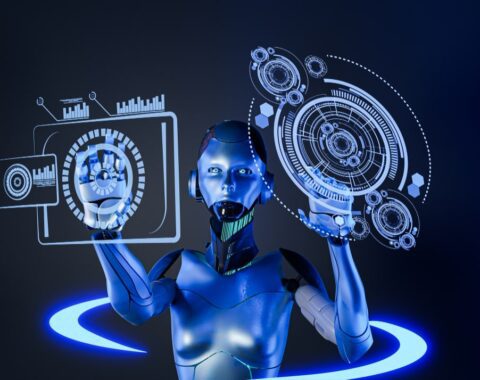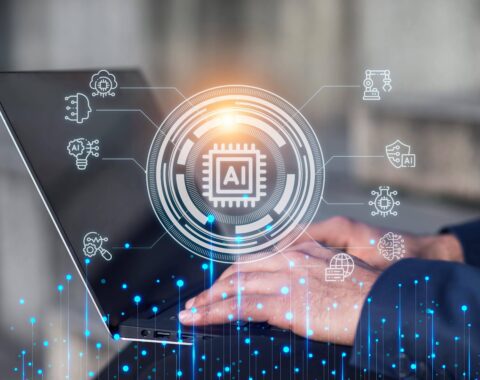There has been a dramatic shift in the labor market as a result of the widespread adoption of artificial intelligence (AI) across several sectors. New AI technology has opened up new doors for automation, data analysis, and machine learning. As a result, it has stoked fears of job loss for the human workforce working at entry-level jobs.
Standardized processes and improved effectiveness of AI technology have had an effect on conventional job responsibilities in sectors including production, client service, and data analytics. At the same time, new occupations have appeared that need professionals with expertise in AI creation, upkeep, and ethical regulation.
The ever-changing nature of the field necessitates a commitment to lifelong learning and flexibility. There is a complicated interplay between innovation, problems, and the need for a flexible, future-ready staff as it relates to the effect of AI on the structure of the labor market.

How Does AI Change the Nature of Employment Opportunities?
The constant innovation in the latest AI technology has been changing the nature of job roles and new employment opportunities. You can see its impact on the following sectors:
Task Automation Software
Automation of entry level human work is one of the most popular advancements of new AI technology. However, you can see the drastic effects on the labor market. Automation can take over processes like data entry, appointment booking, and perhaps some customer service contacts. As a result of automation, companies can see greater efficiency and lower operating costs. However, at the expense of human workers.
Creating New Job Prospects
We know that AI has the potential to replace the human workforce. However, it is also generating new job prospects. You can see that the demand for AI specialists like machine learning engineer has been growing in the corporate world. The reason is that companies are investing in designing, developing, and maintaining AI systems. The great scope is in the fields of data science, artificial intelligence engineering, and machine learning engineering.
Evolution of New Skillsets for Job Roles
The advancement of AI is gradually altering the expertise needed for different job roles. You should have a clear idea of artificial intelligence vs machine learning and the tasks related to them. The best example is that those tasks that only involve physical labor now need expertise in computer programming and data analysis. People are polishing their skill sets with new ones in order to fit in with the latest advancements. So, people need to learn these new skills to survive in a greatly shifting competitive employment market.
Soft Skills Are In High Demand
As new AI technology automates more and more mundane work, the remaining occupations will demand higher levels of critical thinking. Additionally, more originality from their employees. So, they need to keep up with these new high demand soft skills. As it will help them to communicate effectively and to work well with others in the industry.
As AI becomes more prevalent, certain occupations will be rendered obsolete. It is advised to get expertise in machine learning Python. Data input and customer service are two examples of tasks that could be replaced by machines. Those whose jobs are lost to automation may find themselves out of work and in need of retraining.
Salary Effects
Artificial intelligence (AI) is having an effect on the labor market that includes salary stagnation or even declines. New AI technology has the potential to complete tasks that were previously done by humans. The need for human labor in that market area drops. Therefore, the wage rate also declined in that sector. Furthermore, the work that was previously done by a couple of employees is now being done by a single software. So, it keeps their salaries at stake.
Implications For The Freelance Sector
Freelancers or gig laborers have been facing serious complications in the gig economy. Moreover, these challenges are caused by the advancement of artificial intelligence. As, a result, you will see a significant decrease in the need for human laborers since automation processes in multiple fields.
How Does Artificial Intelligence Affect the Workforce?
The advancement of artificial intelligence has created the following issues for human labor:
Loss of Employment
The possible loss of jobs due to the rise of artificial intelligence is a major cause for concern. Data entry and assembly line work are two examples of jobs that are becoming mechanized because they require repetitive, menial tasks. The economic and social costs of this migration include increased unemployment and wider income gaps. Upskill yourself with natural language proc.
Competency Gap
New occupations made possible by AI may call for expertise unrelated to that of workers whose positions are being eliminated. There is a huge chance of missing out if you do now know UCI machine learning repository, python deep learning, or other similar expertise. So, people can face difficulties if they believe their existing talents to be inadequate due to this skill mismatch. To close the skills gap and facilitate a seamless transfer into new employment roles, reskilling and upskilling programs assume paramount importance.
Moral Factors to Think About
Since New AI technology is increasingly being used in decision-making roles, it is essential to take ethics into account. Any random issues in algorithms or a lack of transparency can cause unfair treatment of some people. Therefore, we need to outline an ethical framework for AI strategies and norms. As it is important for preserving workplace responsibility and justice.
Workforce Retraining and Change
There is also a chance that AI can reshape existing jobs rather than completely abolish them. You will see a rise in job rise in essing companies. In addition, it will supplement jobs that entail repetitive chores with AI technologies. Hence, it will free up employees’ time for more valuable work.
So, the workers will need to update their skills and adjust to the changing nature of the workforce as a result of this shift. The difficulty lies in helping people get the training and tools they need to succeed in their new roles.
How AI Can Rise to the Job Market Challenges?
AI is poised to be a game-changer in helping us face and conquer the difficulties of the modern labor market. As well as automating mundane jobs and increasing productivity. So, AI opens up new job opportunities thanks to its use of cutting-edge algorithms and machine learning.
Moreover, new AI technology helps organizations expand by enabling better analysis of available data. Hence it facilitates more educated decision-making. Furthermore, AI-driven technologies provide adaptive machine learning solutions. As a result, making it easier for workers to acquire the latest and greatest skillsets. So, they can match the ever-changing demands of the labor market. Let’s look at the table to understand it more comprehensively:
| Challenge | AI Solution |
| Automation of Common Processes | Artificial intelligence (AI) algorithms can automate boring or time-consuming work. |
| Provision of Alternative Employment Paths | AI-powered industries create new job roles |
| Optimized Data Analysis | Facilitate in-depth data analysis for well-informed judgment. |
| Solution-Based Adaptive Learning | AI-powered learning management systems can facilitate skill development. |
| Flexible Organizational Structures | AI can adjust to new circumstances in the workplace and guarantees an active labor force. |
| Fostering Innovation | AI-driven breakthroughs offer new markets and occupations, boosting economic development. |
Conclusion
It will be difficult and complex to foresee how exactly new AI technology will affect the labor market. However, we need to adapt to the changing dynamics of the labor market. So, we can build a future in which humans and machines cooperate. It can only be possible if we acknowledge the promise of artificial intelligent automation. Moreover, retrain and reskill the workforce, and promote interactive landscapes.


